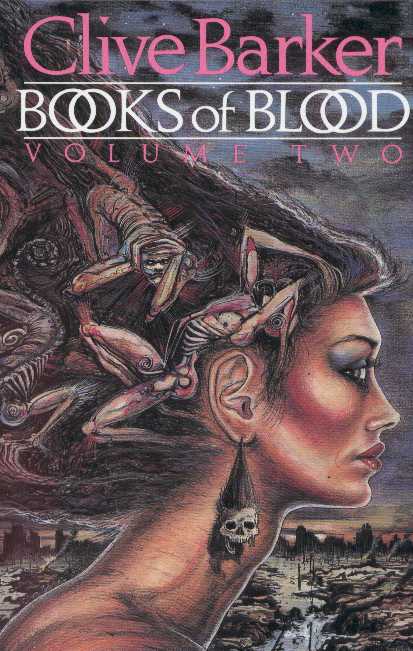Book Review: Clive Barker’s Books of Blood Volume II by Clive Barker
Everybody is a book of blood; wherever we’re opened, we’re red.
Prescript to the Books of Blood, presumably a joke by Clive Barker himself.
In the mid-1980s, Clive Barker broke onto the horror scene with a collection of short(ish) stories divided up into multiple volumes for the paperback trade. They were gobbled up by aficionados of the horror genre, and Mr. Barker became inescapable in the field for a decade or so. I recall these were some of the few books that affected me physically; back in the day I used to feel dizzy after reading them.

There’s five gruesome tales in the volume I have to hand. “Dread” could theoretically take place in the real world. Literature major Steve Grace takes an Ethics class as a break and runs into older philosophy student Quaid. Quaid’s an “action” philosopher who wants to study primal fear by forcing people to confront what they dread. First he locks a vegetarian in a room with nothing to eat but a slab of meat. Then it’s Steve’s turn to face dread. But this time, Quaid (who has some well-hidden fears) may have dug his own pit.
“Hell’s Event” takes us to a London marathon that has some unexpected twists. Every hundred years, Hell gets to have a runner in the race, and if they win, that’s the end of human self-determination. This time, Hell’s going all out to cheat. In the immortal words of Satchel Paige, “Don’t look back. Something might be gaining on you.” Content note: racism.
“Jacqueline Ess: Her Will and Testament” concerns a woman who has attempted suicide. Fed up with her condescending and very “man who thinks he knows better than women about their own minds” psychiatrist, she wills him to have an involuntary sex change. It sort of works, killing him in the process. Turns out that somehow Ms. Ess has gained the power to sculpt flesh with her mind.
Problem is that it’s a very brute force kind of power, and although she gains fine control over time, most of the men Jacqueline Ess meets end up dead in very grotesque ways. There’s some excellent gruesome moments here, but a lot of padding and the story seems longer than it is.
“The Skins of the Fathers” moves the action to Arizona, where every so often a remote part of the desert sees underground monsters emerge. A man whose car has broken down sees a procession of them and attracts their attention. He’s surprised when one of the monsters doesn’t kill him, but instead smashes up his stalled automobile. The ensuing explosion sets it on fire and into the nearby town.
The local sheriff is maimed by the burning creature, and the townsfolk form a posse to destroy the “divils.”
But from the “divils'” point of view, they’re having a fun excursion to pick up a child one of them spawned a few years back. Any harm to humans is incidental. That is, until the humans make a point of attacking. This does not end well.
And finally, “New Murders in the Rue Morgue” is a take on the classic Edgar Allen Poe story. It seems that C. Auguste Dupin was a real person, the cases of whom Mr. Poe fictionalized based on tales he was told by the great detective’s brother. But at this late date, just how much of the stories were actually true is unknown. Dupin died young, before his children had a chance to ask, and his elderly grandson Lewis only keeps the notion alive as a tale.
But now his childhood friend Phillipe is in prison, accused of a horrible crime reminiscent of the Rue Morgue. And as Lewis investigates, it seems there is a man-like thing in the streets that is familiar in a terrific manner.
The marathon and Arizona stories are the best, while Jacqueline Ess drags.
General content notes: body horror, body fluids, abuse, slut-shaming, torture, animal abuse, sexism.
It’s easy to see why this series made Clive Barker a haunted household name. Consider getting one of the omnibus editions.

